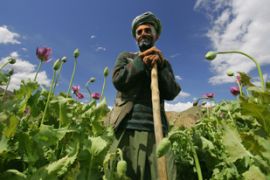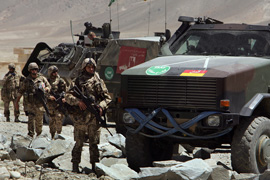Nato snubs bid to curb Afghan opium
Isaf force in Afghanistan will have no ‘direct role’ in destroying opium crops.

The majority of production has occured in areas considered strongholds for members of the Taliban fighting the international forces in Afghanistan.
Losing battle
The UN office on drugs and crime urged Isaf to become involved in attempts to eradicate the crops after it released a survey last month showing opium production had risen to a record high.
 |
| International troops are struggling to contain increased attacks [GALLO/GETTY] |
The Afghan government has made a similar call, saying it had asked international forces based in the country to drive out Taliban fighters from opium-growing areas so its own forces can move in to destroy the crops.
Experts have said that the Taliban is financed by the drugs trade.
In an interview with the Berliner Zeitung newspaper, Tom Koenigs, the senior UN envoy to Afghanistan, criticised the German troop contingent for not playing a role in fighting drugs.
Koenigs said: “I think the German army stationed there should support the police in the fight against drugs and drug laboratories and not say: ‘That has got nothing to do with us’.”
Increased attacks
Meanwhile, officials say at least 15 people have been killed in new attacks across Afghanistan.
Two Afghan policemen were killed on Wednesday when a bomb ripped through their patrol vehicle in the eastern province of Paktia, an Afghan military spokesman said.
Elsewhere the US military claimed nearly a dozen fighters were killed in the southern province of Zabul on Tuesday, after Afghan security forces had called in US-led coalition warplanes to attack their positions.
Isaf has said that Taliban attacks were likely to increase during the holy month of Ramadan due to start on Thursday.